 1960-1962
1960-1962
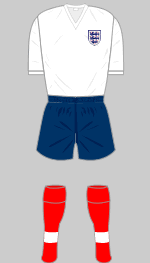
8 Oct-19 Oct 1960
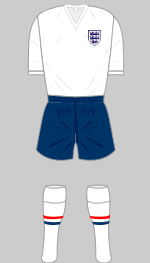
26 Oct 1960 v Spain
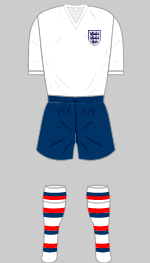
23 Nov 1960 v Wales
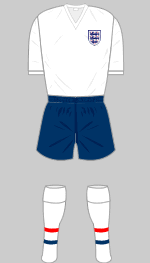
15 Apr 1961 v Scotland
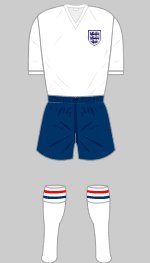
10 May 1961 v Mexico
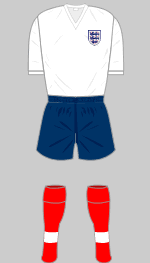
21 May 1961-April 1962
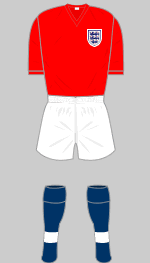
27 May 1961 v Austria
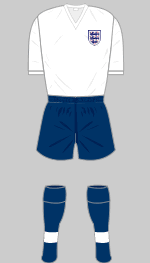
14 Oct 1961 v Wales
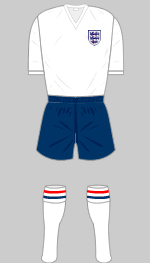
May-Nov 1962
Also used 25 Oct 1961 v Portugal
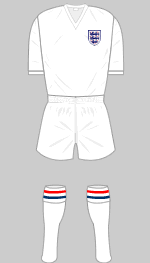
World Cup Finals 1962 Alternate
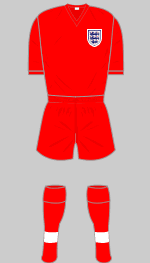
World Cup Finals 1962 Change
Also used 20 May 1962 v Peru
Designer: Bukta
Bukta replaced Umbro as the team's kit supplier at the beginning of the 1960-61 season although the strips were identical apart from the font used for the numbers on the back of each shirt. Close examination revealed that the badge was no longer supported by a scroll, allowing the manufacturer to produce standard shirts without the inconvenience of applying additional patches for each match. (Umbro made red shirts were worn in the 1961 match against Austria.)
Various stockings were tried until the run-up to the 1962 World Cup in Chile, when white socks with a red and navy cadet stripe became standard. (When England played Brazil in the quarter-final half the team had to wear plain white socks, possibly because the management had not packed enough pairs to see them through to this stage.) An all-red strip was used in the pre-tournament tour (v Peru) and again in the competition itself (v Bulgaria) and all-white was worn against Argentina and Brazil.
 1963-1965
1963-1965
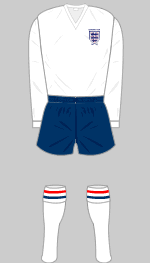
Feb-Oct 1963
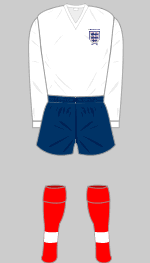
8 May 1963 v Brazil
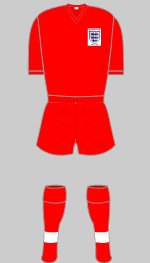
29 May 1963 v Czechoslovakia
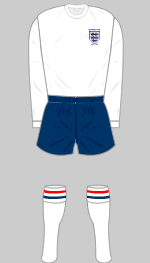
Oct 1963-Nov 1963
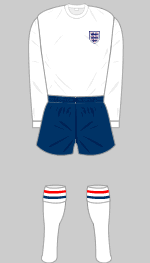
1964-1965
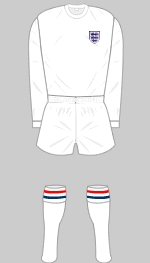
6 May 1964 v Uruguay
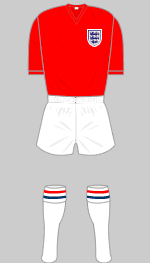
May-June 1964 v Portugal & USA

24 May 1964 v Rep of Ireland
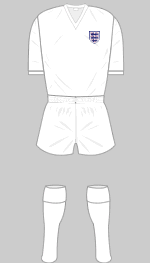
30 May 1964 v Brazil
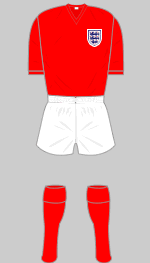
6 June 1964 v Argentina
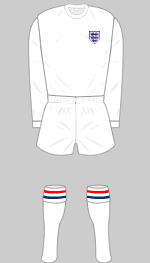
1964-1965 Alternate
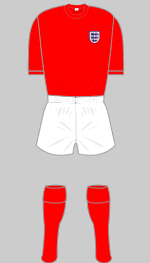
1964-1965 Change
Designer: Bukta
In 1963, Alf Ramsey was appointed as England's manager with control over team selection as well as tactics. He famously predicted that his team would win the World Cup three years later when the competition would be held in England. 1963 was also the centenary of the Football Association and to mark the occasion, the word "Centenary Season 1863-1963" framed the badge. Modern crew necks were introduced ahead of the centenary game against a Rest of the World XI on 23 October 1963 although the red change shirts retained V necks until 1965.
During the matches played in the Spring of 1963 a mixture of long and short sleeved shirts appeared for the first time.
The red and white change kit was similar to the one first used during the summer tour against Argentina, but with crew necks and an all-white alternate kit was used for matches with Uruguay (6 May 1964), Belgium (21 October 1964) and Sweden (16 May 1965).
 1965-1974
1965-1974
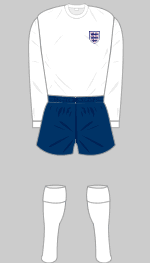
1965-1974
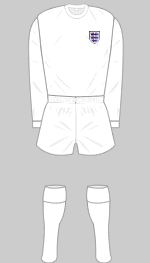
1965-1974 Alternate
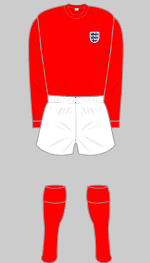
1965-1974 Change
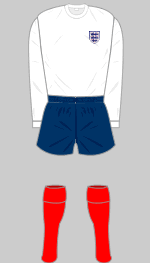
23 Feb 1966 v W Germany
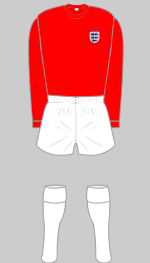
6 Nov 1968 v Rumania
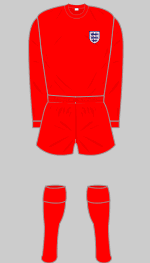
25 Feb 1970 v Belgium
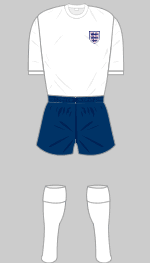
20 May 1970 v Colombia
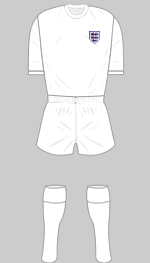
1970 World Cup
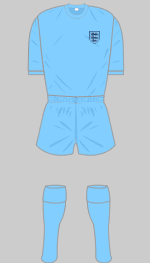
1970 World Cup v Czechoslovakia
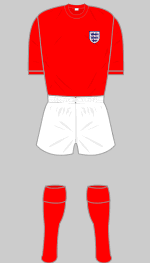
1970 World Cup v West Germany
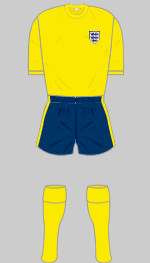
Summer 1973

10 June 1973 v USSR
5 June 74 v Yugoslavia

10 May 1974 v GDR

1 June 1974 v Bulgaria
Designer: Umbro
At the beginning of the 1965-66 season Umbro replaced Bukta as kit suppliers and plain white stockings were introduced. There was no other change to the design, generally regarded as the best in England's long history for its simplicity and elegance.
The all-white alternate strip was used
against Spain and, of course in the tumultuous World Cup quarter-final game against Argentina on 23 July 1966. It also was used thoughout the 1969 summer tour against Mexico, Uruguay and Brazil.
The red and white change kit was used several times, most famously, of course, in the 4-2 1966 World Cup Final triumph against West Germany. Two variants appeared - red shorts were worn in an away game against Belgium (25 Feb 1970) and white shorts and socks were used against Rumania (6 Nov 1968) and Bulgaria (1 June 1974).
The 1970 World Cup was held in Mexico at the height of the summer, prompting concern about both the heat and altitude. Sir Alf Ramsey ordered a new set of kits for the competition to be manufactured in Aertex, a lightweight cellular material designed for hot climates. White shorts were worn (Ramsey thought navy would absorb too much heat) although traditional navy versions appeared in the warm-up match in Colombia. A pale blue outfit was designated as England's change kit and used once, against Czechoslovakia, attracting complaints from TV viewers that the teams were indistinguishable (not many colour TVs in those days). For the quarter-final against West Germany, England donned a lightweight version of their red and white kit but history did not repeat itself, Germany coming back from two-goals down to win in extra-time.
After England failed to qualify for both the 1972 European Championships and 1974 World Cup, Ramsey was dismissed and Joe Mercer took over as caretaker manager.
Inexplicably, England played three matches in May/June 1973 wearing yellow shirts even though a change was needed only for the game against Poland. After one draw and two defeats, this outfit was never seen again.
The iconic white shirt with navy shorts made its final appearance on 22 May 1974 at Wembley when England played Argentina.
 1974-1980
1974-1980
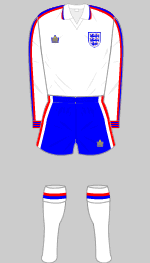
1974-1980
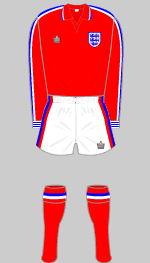
1974-1981 Change
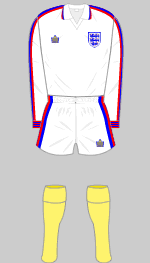
23 May 1976 v Brazil
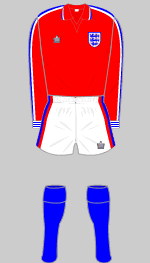
8 June 1977 v Brazil
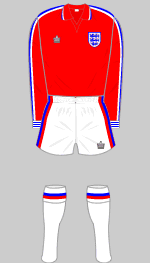
9 June 1979 v Bulgaria
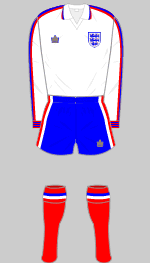
22 Nov 1979 v Bulgaria
Designer: Admiral
In 1974 Don Revie was appointed as England manager and Admiral, associated with Revie's former club, Leeds United, became their new kit supplier. In a landmark deal, Admiral gained exclusive rights to manufacture and market replica kits in return for royalty payments to the FA. Although these were negligible at first, by 1986 the FA was earning £120,000 a year from replica sales, a considerable sum at the time. For the arrangement to work, Admiral needed to redesign the kit so they could register copyright, a strategy they pursued with great success at club level. For the first time England's strips carried a manufacturer's logo, which many thought an unwelcome development.
As replica sales became significant, the England team played home matches from time to time in their red kit, ensuring that new editions of each change strip received at least one outing in front of supporters at home. An all-yellow strip was used once for an unofficial international against Team America in 1976, the yellow stockings reappearing for the game with Brazil in the same pre-World Cup tournament.
During 1977 the trim on the shorts was slightly narrower.
England failed to reach the finals of the 1976 European Championship and the World Cup of 1978 while wearing ths outfit but they did qualify for the 1980 European Championship. The white kit was worn for the last time against Spain on 26 March 1980 but the red change kit was retained until its last outing in May 1981 when Brazil were the visitors at Wembley.
 1980-1983
1980-1983
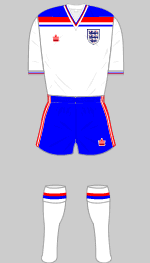
1980-1981
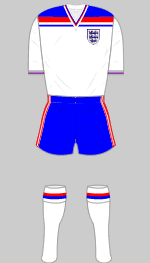
1980 European Championships
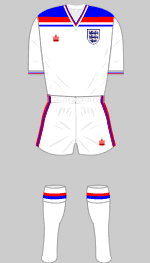
1980-1981 Alternate
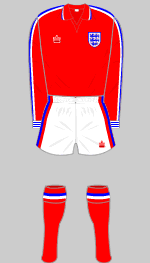
12 May 1981 v Brazil
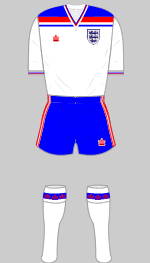
1981-1983
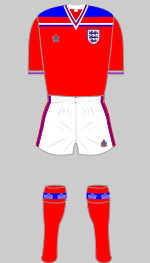
1982-1983 Change

1982 World Cup Finals
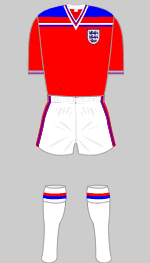
WCF 1982 v France
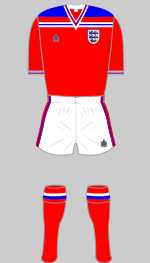
WCF v West Germany
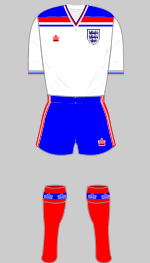
1982 13 Oct v West Germany
Designer: Admiral
Admiral's second design was introduced in May 1980 ahead of the European Championships, the first time England had appeared in the final stages of a major tournamant in a decade. The unique design proved very popular with supporters. Shirts were produced in both long and short-sleeved versions although players generally favoured short sleeves.
The versions worn in the European Championships had the Admiral logos removed because of a ban on advertising. An all-white version was used against Romania (15 Oct 1980) and Spain (25 March 1981).
From the beginning of the 1981-82 season, the red and blue bands on the stocking turnovers were replaced with a single blue hoop with red Admiral logos, but the old versions were reinstated for the 1982 World Cup Finals in Spain.
The red change kit was worn for the first time on 3 June 1982 in Finland and then appeared twice in the World Cup Finals (the version worn against West Germany had a slightly different design on the chest). It was then used against Greece in both legs of the European Championships qualifiers the following season. The white version was retired after the match with Luxembourg on 16 November 1983.
< England 1946-1960 |
Home Nations Index Page |
England 1984-1997 >



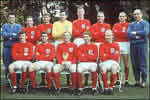 Alf Ramsey took over as England's team manager in 1963 and announced his intention to win the World Cup in 1966. On a brilliant July afternoon, England's captain, Bobby Moore lifted the Jules Rimet trophy after a dramatic 4-2 extra-time win over West Germany. Four years later the Germans had their revenge, overturning a two-goal deficit to beat England in the quarter-final of the same competition in Leon, Mexico. England would not appear in the final stages of any major competition until 1980 when they qualified for the European Championship finals in Italy.
Alf Ramsey took over as England's team manager in 1963 and announced his intention to win the World Cup in 1966. On a brilliant July afternoon, England's captain, Bobby Moore lifted the Jules Rimet trophy after a dramatic 4-2 extra-time win over West Germany. Four years later the Germans had their revenge, overturning a two-goal deficit to beat England in the quarter-final of the same competition in Leon, Mexico. England would not appear in the final stages of any major competition until 1980 when they qualified for the European Championship finals in Italy. 














































